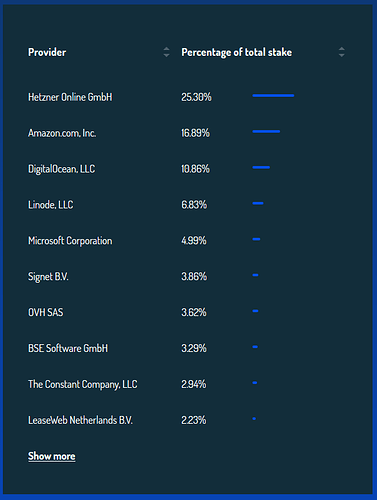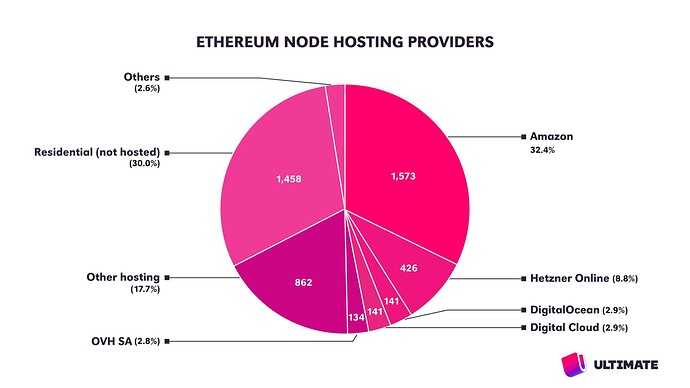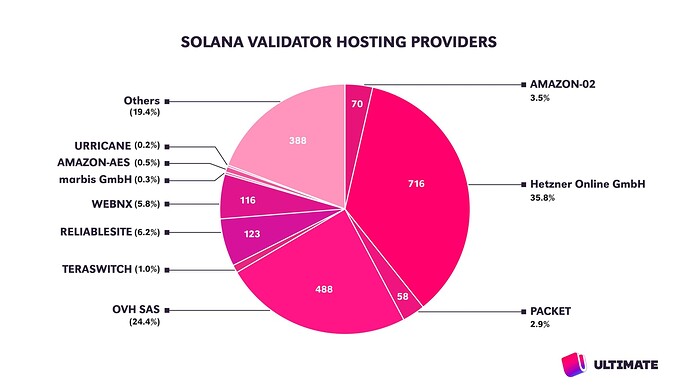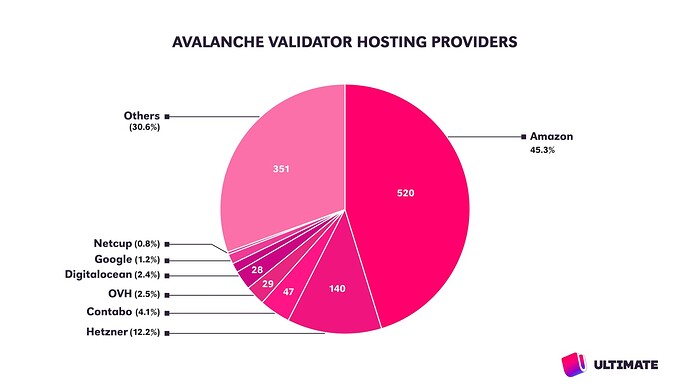Using our products for any application related to mining, even remotely related, is not permitted. This includes Ethereum. It includes proof of stake and proof of work and related applications. It includes trading. It is true for all of our products, except colocation. Even if you just run one node, we consider it a violation of our ToS. We are aware that there are many Ethereum users currently at Hetzner, and we have been internally discussing how we can best address this issue.
You can find the full statement here and an article explaining more here.
Currently, 25.30% of total delegated stake on Radix is hosted on Hetzner nodes.
The situation for other cryptos isn’t that different, with Ethereum at a 8.8%:
Solana 35.8%:
Avalanche 12.2%:
My thoughts:
Hetzner doesn’t really know what’s the difference between staking/PoS and mining/PoW is, so they’re just making this blanket ban about anything related to cryptocurrency, just to be sure no one is abusing their resources (which now, thanks to the increasing energy prices, are even more expensive).
The operation of applications for mining cryptocurrencies remains prohibited. These include, but are not limited to, mining, farming and plotting of cryptocurrencies. We are entitled to lock the Customer’s access to their Hetzner services or account in the event of non-compliance.
It is not clear what they mean by that. Is even a simple gateway node prohibited? It’s not much different than a database server. I imagine that soon Hetzner will clarify what they meant, since they’re now getting a lot of attention and not the good kind.
As a node runner, this concerns me but not by a lot, since I self host my own node from home using my FTTH connection (you can learn more about my infrastructure here: Introducing 🍕 MattiaNode).
I use Hetzner’s dedicated servers as backup nodes but I also have another self hosted node elsewhere, with independent power and connectivity from my primary.
I will consider moving away from Hetzner soon unless they give a proper statement about what they meant and what it means for PoS coins and nodes.
Self hosting comes with some disadvantages, which may translate in losing some proposals, but I’d rather lose a few proposals but improve decentralization and the safety of the whole Radix network. With the exception of some maintenance or some particular issue, my uptime is usually 100%.
Does that mean that 25% of Radix validators are soon illegal because they run on Hetzner?
No, running a validator isn’t illegal, but it may be against their ToS. Like I said though, it would be highly improbable for Hetzner to bring down all nodes at the same time. If they were to do so, not only would they lose lots of customers but they would also bring down some and slow down other cryptocurrencies that use their services.
In the highly improbable scenario where Hetzner would drop all Radix nodes at the same time from its network, what would be the impact on the Radix network?
If that were to happen, there would be a very noticeable impact on the whole Radix network: we’ve seen a similar but lighter scenario with the Viskosity incident, where a top 10 node started missing all proposals for some days. Epochs became much longer, from 40 minutes to 1 hour~ and because of that, the APY from staking dropped significantly.
Losing 25% of total stake will have a much worse impact on epoch length. As a comparison, it would be like losing almost all top 10 nodes instead of just one, like it happened with Viskosity, since the top 10 nodes hold 28.47% of the total stake:
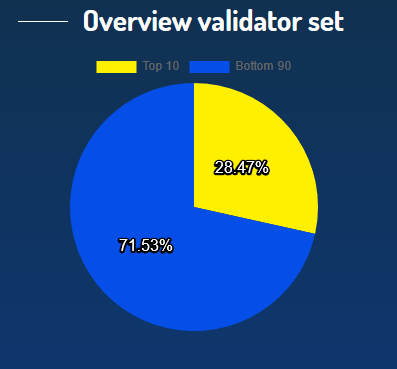
Will there be an impact on the Radix network if node runners decide to move away from Hetzner?
The impact will likely be minimal, if any. Node runners are used to switching between backup and main nodes without losing proposal, especially if not in the top 10 (more time between every proposal for the failover).
From @Faraz:
Stakers don’t need to do anything if a validator moves their node. We moved out of Hetzner when it was first discovered that 25% of Radix validators were hosted there. It can be done without even missing a single proposal (depending on validator stake weight) and even in a worst case scenario, a validator simply unregisters for an epoch (a small price to pay for stakers to miss one epoch of rewards in the interest of decentralisation and security).
How can I find out where each validator is located geographically and what provider it’s using?
You can use the great tool from the Stakesafe team: https://validators.stakesafe.net/
What do you guys think about this? I’d like to hear from both node runners and delegators.
Would you consider moving your stake to a decentralized/self-hosted node after this incident? Or do you prefer trying to maximize your uptime delegating to nodes hosted on major providers like AWS/Hetzner?
And to my fellow node runners, if you’re using Hetzner, what are you planning to do? Will you move your nodes elsewhere or wait and see what happens?
Sources:
